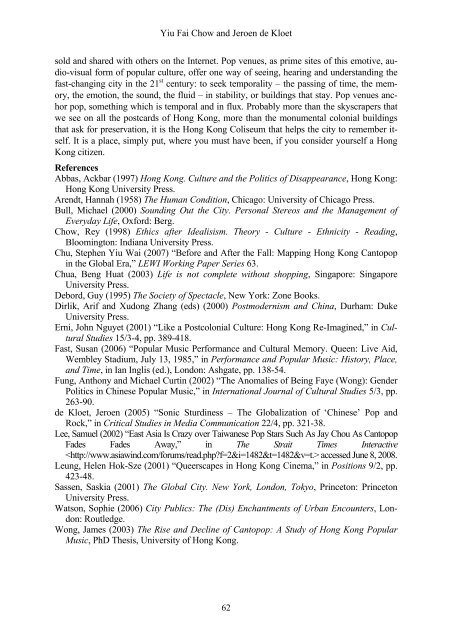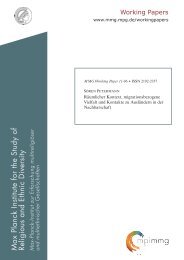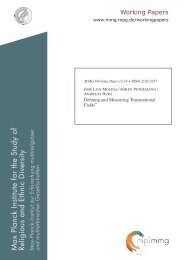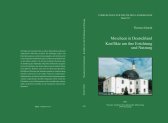Building Memories – A Study of Pop Venues in Hong Kong
Building Memories – A Study of Pop Venues in Hong Kong
Building Memories – A Study of Pop Venues in Hong Kong
Create successful ePaper yourself
Turn your PDF publications into a flip-book with our unique Google optimized e-Paper software.
Yiu Fai Chow and Jeroen de Kloet<br />
sold and shared with others on the Internet. <strong>Pop</strong> venues, as prime sites <strong>of</strong> this emotive, audio-visual<br />
form <strong>of</strong> popular culture, <strong>of</strong>fer one way <strong>of</strong> see<strong>in</strong>g, hear<strong>in</strong>g and understand<strong>in</strong>g the<br />
fast-chang<strong>in</strong>g city <strong>in</strong> the 21 st century: to seek temporality <strong>–</strong> the pass<strong>in</strong>g <strong>of</strong> time, the memory,<br />
the emotion, the sound, the fluid <strong>–</strong> <strong>in</strong> stability, or build<strong>in</strong>gs that stay. <strong>Pop</strong> venues anchor<br />
pop, someth<strong>in</strong>g which is temporal and <strong>in</strong> flux. Probably more than the skyscrapers that<br />
we see on all the postcards <strong>of</strong> <strong>Hong</strong> <strong>Kong</strong>, more than the monumental colonial build<strong>in</strong>gs<br />
that ask for preservation, it is the <strong>Hong</strong> <strong>Kong</strong> Coliseum that helps the city to remember itself.<br />
It is a place, simply put, where you must have been, if you consider yourself a <strong>Hong</strong><br />
<strong>Kong</strong> citizen.<br />
References<br />
Abbas, Ackbar (1997) <strong>Hong</strong> <strong>Kong</strong>. Culture and the Politics <strong>of</strong> Disappearance, <strong>Hong</strong> <strong>Kong</strong>:<br />
<strong>Hong</strong> <strong>Kong</strong> University Press.<br />
Arendt, Hannah (1958) The Human Condition, Chicago: University <strong>of</strong> Chicago Press.<br />
Bull, Michael (2000) Sound<strong>in</strong>g Out the City. Personal Stereos and the Management <strong>of</strong><br />
Everyday Life, Oxford: Berg.<br />
Chow, Rey (1998) Ethics after Idealisism. Theory - Culture - Ethnicity - Read<strong>in</strong>g,<br />
Bloom<strong>in</strong>gton: Indiana University Press.<br />
Chu, Stephen Yiu Wai (2007) “Before and After the Fall: Mapp<strong>in</strong>g <strong>Hong</strong> <strong>Kong</strong> Cantopop<br />
<strong>in</strong> the Global Era,” LEWI Work<strong>in</strong>g Paper Series 63.<br />
Chua, Beng Huat (2003) Life is not complete without shopp<strong>in</strong>g, S<strong>in</strong>gapore: S<strong>in</strong>gapore<br />
University Press.<br />
Debord, Guy (1995) The Society <strong>of</strong> Spectacle, New York: Zone Books.<br />
Dirlik, Arif and Xudong Zhang (eds) (2000) Postmodernism and Ch<strong>in</strong>a, Durham: Duke<br />
University Press.<br />
Erni, John Nguyet (2001) “Like a Postcolonial Culture: <strong>Hong</strong> <strong>Kong</strong> Re-Imag<strong>in</strong>ed,” <strong>in</strong> Cultural<br />
Studies 15/3-4, pp. 389-418.<br />
Fast, Susan (2006) “<strong>Pop</strong>ular Music Performance and Cultural Memory. Queen: Live Aid,<br />
Wembley Stadium, July 13, 1985,” <strong>in</strong> Performance and <strong>Pop</strong>ular Music: History, Place,<br />
and Time, <strong>in</strong> Ian Inglis (ed.), London: Ashgate, pp. 138-54.<br />
Fung, Anthony and Michael Curt<strong>in</strong> (2002) “The Anomalies <strong>of</strong> Be<strong>in</strong>g Faye (Wong): Gender<br />
Politics <strong>in</strong> Ch<strong>in</strong>ese <strong>Pop</strong>ular Music,” <strong>in</strong> International Journal <strong>of</strong> Cultural Studies 5/3, pp.<br />
263-90.<br />
de Kloet, Jeroen (2005) “Sonic Sturd<strong>in</strong>ess <strong>–</strong> The Globalization <strong>of</strong> ‘Ch<strong>in</strong>ese’ <strong>Pop</strong> and<br />
Rock,” <strong>in</strong> Critical Studies <strong>in</strong> Media Communication 22/4, pp. 321-38.<br />
Lee, Samuel (2002) “East Asia Is Crazy over Taiwanese <strong>Pop</strong> Stars Such As Jay Chou As Cantopop<br />
Fades Fades Away,” <strong>in</strong> The Strait Times Interactive<br />
accessed June 8, 2008.<br />
Leung, Helen Hok-Sze (2001) “Queerscapes <strong>in</strong> <strong>Hong</strong> <strong>Kong</strong> C<strong>in</strong>ema,” <strong>in</strong> Positions 9/2, pp.<br />
423-48.<br />
Sassen, Saskia (2001) The Global City. New York, London, Tokyo, Pr<strong>in</strong>ceton: Pr<strong>in</strong>ceton<br />
University Press.<br />
Watson, Sophie (2006) City Publics: The (Dis) Enchantments <strong>of</strong> Urban Encounters, London:<br />
Routledge.<br />
Wong, James (2003) The Rise and Decl<strong>in</strong>e <strong>of</strong> Cantopop: A <strong>Study</strong> <strong>of</strong> <strong>Hong</strong> <strong>Kong</strong> <strong>Pop</strong>ular<br />
Music, PhD Thesis, University <strong>of</strong> <strong>Hong</strong> <strong>Kong</strong>.<br />
62






